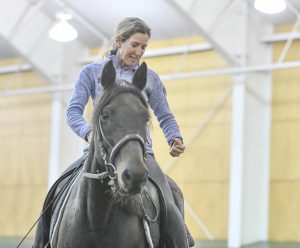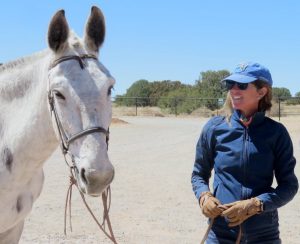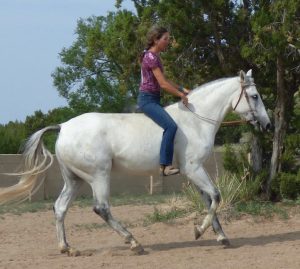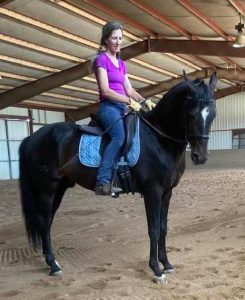Editor’s Note: Best Horse Practices Summit presenter Katrin Silva grew up riding dressage in Germany before moving to the United States at age 19 to learn to ride Western. She’s been riding both disciplines for the last 20 years and is a regular guest columnist for Cayuse Communications. The author of Dressage for All of Us: How to Help Any Horse Become a Happier, More Responsive Riding Partner lives in New Mexico where she works with dressage and Western clients.
Katrin’s upcoming book is Feel for All of Us, due in early 2022. Read more about that here.

Katrin Silva at the 2019 Summit. Photo by Nina Fuller
Katrin writes:
I have preferred not to think about old age. But not wanting to think about it doesn’t stop the process. Evidence is everywhere:
- Recovering from a long run takes longer now than it used to.
- Mounting blocks look more inviting and more reasonable every year.
- The face looking at me from the mirror has wrinkles.
My friend Julie, whose 80th birthday is right around the corner, rolls her eyes when I complain to her about getting older. “It beats the alternative!” she keeps telling me. I have to agree. I’ll choose old age over an early grave any day. I am also discovering that not age-related changes are bad.
At 51, I feel deeply grateful to be alive and healthy. I know horses are large and potentially dangerous without even meaning to be. I know if you get on lots of horses, you will come off a few. I have hit the dirt plenty of times, but only now realize how lucky I’ve been in avoiding serious injury. In 30-plus years of starting colts and re-starting colts started badly by others, I’ve never broken any important bones or spent a night at a hospital. I could say that’s because I’m very good at riding green horses, but who am I kidding? It takes only a split-second of bad judgment to cause a wreck. I’ve been lucky.
 Being more aware of mortality, I’ve become more cautious. I still do what I love: ride horses all day. But with every passing year, I do more things I’d roll my eyes at when I was younger. Lungeing a frisky horse before I get on now seems sensible instead of chicken-hearted. So does stepping back from some things I used to do; until a few years ago, starting young horses and re-starting troubled horses was my superpower. I’d be happy to get on horses who bolted, bucked, or reared.When I turned 50, my mind shifted. I turned down a horse brought to me for 30 to 60 days, “just to get the bucks out.” I started thinking about potential consequences of saying yes:
Being more aware of mortality, I’ve become more cautious. I still do what I love: ride horses all day. But with every passing year, I do more things I’d roll my eyes at when I was younger. Lungeing a frisky horse before I get on now seems sensible instead of chicken-hearted. So does stepping back from some things I used to do; until a few years ago, starting young horses and re-starting troubled horses was my superpower. I’d be happy to get on horses who bolted, bucked, or reared.When I turned 50, my mind shifted. I turned down a horse brought to me for 30 to 60 days, “just to get the bucks out.” I started thinking about potential consequences of saying yes:
- Would this short-term project be worth the risk I took?
- Would it be fair to all my long-term clients to take that risk?
I remain a confident rider, but I now stop and think before agreeing to take on new projects. Caution means I factor my desire to live and ride for as long as I can into my daily decisions. Not a bad idea at any age.
 I’ve also found there is some truth about age and wisdom. Thanks to riding so many different horses for so many years, I have a huge vault of experience. While I keep learning, I also revisit lessons I’ve learned years ago, from horses similar to ones I work with today. I fine-tune my approach by repeating what worked in the past and changing what did not work so well. The puzzle of good horsemanship is beginning to look more like a picture and less like a confusing patchwork quilt riddled with holes.
I’ve also found there is some truth about age and wisdom. Thanks to riding so many different horses for so many years, I have a huge vault of experience. While I keep learning, I also revisit lessons I’ve learned years ago, from horses similar to ones I work with today. I fine-tune my approach by repeating what worked in the past and changing what did not work so well. The puzzle of good horsemanship is beginning to look more like a picture and less like a confusing patchwork quilt riddled with holes.
Another upside of getting older is that I worry less about what other people think. I feel much more clarity about the why and how of my work. I don’t do it to impress anyone. I do it for the horses, their long-term soundness, their physical and mental well-being.
Over time, I’ve become more adamant about avoiding training band-aids and shortcuts. I haven’t ridden with draw reins or twisted-wire snaffles since my early twenties. Regarding methods and equipment: if it’s not fair to the horse, I won’t go there. Fortunately, my clients’ goals are to build solid partnerships with their horses, instead of finding quick fixes.
 I hope to learn, teach, and ride at least for another 30 years. I know my body will become weaker and my bones more brittle. But even so, as Julie keeps reminding me, old age beats the alternative. And I have something to look forward to: the next level of horsemanship, rooted in even more years of experience and freed from the shackles of external validation and the need to please others. Sounds like a pretty sweet deal.
I hope to learn, teach, and ride at least for another 30 years. I know my body will become weaker and my bones more brittle. But even so, as Julie keeps reminding me, old age beats the alternative. And I have something to look forward to: the next level of horsemanship, rooted in even more years of experience and freed from the shackles of external validation and the need to please others. Sounds like a pretty sweet deal.
Katrin, you are a wonderful writer and always come up with some wonderful insights to share with us!
Thank you, Julie – and right back at you!
yes yes. I am now 66 and more careful everyday! but i teach high-risk kids, and horses are my therapy, so will not be giving it up. i do lots and lots of groundwork before every ride and never go w o my helmt. i also purchased a very quiet QH and started him w Clinton Anderson groundwork. result–quiet, calm, sane.
Please don’t give it up! Horses are therapy for most of us. Thank you for commenting!